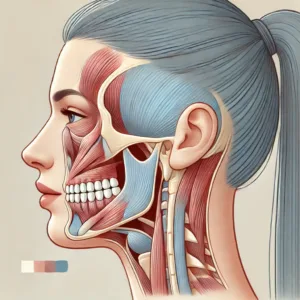TMJ Ringing in Ears Tinnitus Treatment: Finding Relief From Jaw Pain and Ear Noise
Table of Contents

TMJ Ringing in Ears Tinnitus Treatment: Finding Relief From Jaw Pain and Ear Noise
Introduction
Are you dealing with that annoying ringing, buzzing, or hissing sound in your ears? And is it making you feel like you’re constantly stuck in a bad sci-fi movie? You’re not alone. Many people experience tinnitus, and when it’s paired with jaw pain, clicking, or tightness, the culprit might be your temporomandibular joint (TMJ). If you’re searching for TMJ ringing in ears tinnitus treatment, it’s crucial to understand the connection between these two seemingly different issues.
Is your jaw pain causing the tinnitus? Or is there something else at play? Maybe you’ve already tried a bunch of remedies, but nothing seems to work. This blog post is for you. We’re going to dive deep into how TMJ dysfunction can trigger tinnitus, what you can do about it, and how to finally find some relief. Let’s get this annoying ringing under control and get you back to enjoying some peace and quiet.
We will explore what exactly TMJ-related tinnitus is, how it’s diagnosed, and the most effective treatment for tinnitus from TMJ, including at-home strategies and professional interventions. Think of this post as your go-to guide to break down complex information into actionable steps, designed to help you understand the cause of your pain and take charge of your healing journey.
The TMJ and Tinnitus Connection: How Your Jaw Can Cause Ear Ringing
Understanding the TMJ-Ear Connection
So, how exactly is your jaw connected to that persistent ear ringing? It may seem odd, but the temporomandibular joint (TMJ) is intricately linked to the ear via muscles, ligaments, and nerves. When this joint is out of alignment due to conditions like TMJ disorders (TMD), it can wreak havoc on the structures around it, including your ear.
When the muscles surrounding the TMJ spasm or are tense, they can create pressure on the ear canal as well as the nerves that control hearing. This pressure and muscle imbalance can lead to a bunch of issues, including that dreaded tinnitus from TMJ.
Common Causes of TMJ Dysfunction
Several factors can throw your TMJ off balance:
- Bruxism (Teeth Grinding): Often stress-induced, grinding places excessive strain on the jaw.
- Jaw Clenching: Persistent clenching leads to muscle tightness and joint misalignment.
- Arthritis: Inflammation within the joint can contribute to tinnitus symptoms.
- Trauma: Accidents, sports injuries, or whiplash can cause jaw dysfunction.
- Poor Posture: Forward head posture can strain jaw muscles and exacerbate symptoms.
Understanding the underlying cause of your TMJ dysfunction is crucial in developing an effective treatment plan.
Recognizing the Symptoms: Is It Really TMJ-Related Tinnitus?
If you’re experiencing both tinnitus and jaw discomfort, you may wonder if they’re connected. TMJ-related tinnitus often comes with additional symptoms such as:
- Jaw pain or tenderness near the joint.
- Clicking or popping sounds when opening or closing the mouth.
- Limited jaw movement or lockjaw.
- Facial muscle fatigue or stiffness.
- Headaches and earaches that don’t seem to go away.
If these symptoms align with your experience, TMJ may be contributing to your tinnitus. Seeking an accurate diagnosis is essential.
The Diagnostic Process
Diagnosis typically involves:
- Medical History Review: Your healthcare provider will ask about symptoms and possible triggers.
- Physical Examination: Assessing jaw movement, muscle tenderness, and clicking sounds.
- Imaging Tests: X-rays, CT scans, or MRIs to evaluate joint structure.
- Hearing Tests: Conducted by an audiologist to rule out other causes of tinnitus.
TMJ Ringing in Ears Tinnitus Treatment: Your Path to Relief
Once TMJ is identified as the culprit, it’s time to explore treatment options. Addressing the underlying TMJ dysfunction is key to reducing tinnitus symptoms.
At-Home Remedies
- Jaw Exercises: Gentle stretching and strengthening routines to improve mobility.
- Stress Management: Meditation, deep breathing, and mindfulness to prevent clenching.
- Dietary Adjustments: Eating soft foods and avoiding gum to reduce joint strain.
- Hot and Cold Therapy: Alternating heat and ice packs to alleviate inflammation.
- Posture Correction: Maintaining proper head and neck alignment.
Professional Treatment Options
- Physical Therapy: Targeted exercises to release tension and improve joint function.
- Dental Splints: Custom mouth guards to prevent clenching and grinding.
- Medications: NSAIDs, muscle relaxants, or corticosteroids for pain relief.
- Botox Injections: Temporarily relaxing overactive jaw muscles.
- Surgical Interventions: In rare cases, surgery may be recommended for severe TMJ dysfunction.
Long-Term Management and Prevention of TMJ Tinnitus
Keeping symptoms at bay requires ongoing management, including:
- Regular dental check-ups to monitor jaw health.
- Consistent use of relaxation techniques.
- Maintaining good sleep habits.
- Avoiding triggers such as excessive caffeine or hard foods.
Conclusion
Managing TMJ ringing in ears tinnitus treatment requires a multi-faceted approach. From identifying the root cause to implementing home remedies and seeking professional care, relief is possible. Be patient, stay consistent, and work with qualified professionals to achieve long-term improvement.
FAQ
1. Can TMJ-related tinnitus go away?
Yes, with proper treatment and management, many people experience significant relief.
2. What type of specialist should I see?
Dentists specializing in TMJ disorders, physical therapists, and ENT specialists can help.
3. Can TMJ cause permanent ear damage?
While discomfort is common, it usually does not result in permanent hearing loss.












Post Comment